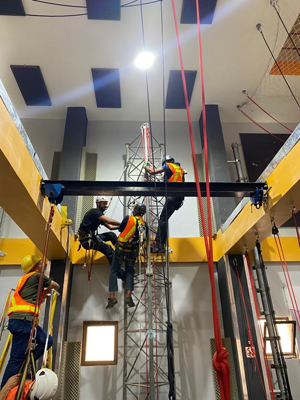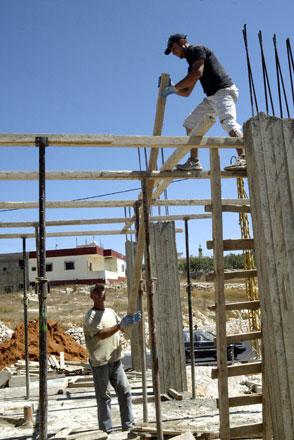You are here
Calls for stronger safety standards rise as work-related injuries become daily occurrence
By Rayya Al Muheisen - Sep 17,2023 - Last updated at Sep 17,2023

POLYGON is the first non-profit work-at-height training centre in Jordan (Photo courtesy of Ghanem Ghunaim)
AMMAN — Occupational safety experts are urging for more stringent measures to combat work-related injuries, with a particular focus on incidents occurring at heights.
Falls from elevated positions continue to be the leading cause of work-related injuries, according to specialists.
In a case highlighting the consequences of inadequate safety measures, an anonymous contractor said that a fall from a considerable height in 2013 left him paralysed.
"I used to work as a contractor, taking on a project in Ramtha,” the source said to The Jordan Times. “I fell from a substantial height, spending over 45 days in the intensive care unit and losing my mobility due to the injury."
The injured contractor was not registered with the Social Security Corporation's (SSC) subscriptions, leaving him without insurance coverage and compensation for his injury.
"Contractors operate on a freelance basis, making it impractical to register and make monthly payments to the SSC," the source said.
On the International Day for Occupational Safety and Health, the non-profit NGO Workers House released a report that revealed a workplace accident occurs every 25 minutes, with a fatality happening every two days among those covered by insurance. Over half a million workers, and 69 per cent of establishments, lack any insurance coverage, according to the report.
It stated that the oversight of occupational safety and health obligations extends to only 5,000 establishments out of the more than 180,000 operating in the Kingdom.
The SSC's data indicates an annual average of 20,000 workplace accidents, resulting in a rate of 11.7 injuries per 1,000 insured individuals.
Falls were identified as the primary cause of workplace injuries, constituting 28.03 per cent of all incidents, followed by injuries resulting from manual tools at 11.9 per cent and injuries caused by falling objects at 9.68 per cent.
Additionally, the report said that 45.9 per cent of recorded workplace injuries with the SSC involve individuals under the age of 30.
Occupational safety expert and founder of POLYGON, the first non-profit work-at-height training centre, Ghanem Ghunaim, emphasised the need for the government to prioritise the safety and health of young workers.
Ghunaim proposed increasing awareness, specialised training programmes, and educational workshops at schools, vocational training centres, colleges and universities.
"Occupational safety awareness and standards should encompass specialised training in occupational safety and health and risk management at workplaces, which should be mandatory for all workers," Ghunaim said.
The report also highlighted that these statistics likely underestimate the number of workplace injuries in Jordan, primarily due to the exclusion of workers in the informal economy, which constitutes nearly 48 per cent of the total workforce.
Ghunaim said that while Jordanian labour law has a dedicated chapter on occupational safety and health but there remains a pressing need for more comprehensive and detailed provisions from a technical perspective.
"Workers must undergo training for working at heights, construction, manufacturing, or any hazardous sector to ensure the health and safety of workers," Ghunaim said, noting that their centre offers customised training tailored to clients' specific needs.
Mahmoud Mana, an expert in working at heights, discussed the lack of occupational safety awareness and education in Jordan.
Mana said companies often prioritise cost-cutting over workers' health, safety and well-being. Mana’ emphasised that construction workers should not be allowed to work alone, especially when working at heights and should always be accompanied by colleagues in case of emergencies.
He also stressed the importance of regularly checking safety equipment and called on the SSC to establish a committee for work at heights that would inspect construction sites and implement the strictest measures to ensure individual safety.
Occupational safety training and education must be mandatory for all workers, with safety standards and procedures requiring frequent updates and checks, Ghunaim and Mana said.
Related Articles
AMMAN — As the construction sector witnesses a “high” number of work-related injuries, stakeholders highlighted the need to enhance collabor
AMMAN — Work-related injuries in Jordan result in a fatality every two days, imposing an economic cost equivalent to approximately 4 per cen
AMMAN — The Social Security Corporation (SSC) said on Monday that it registered 17,746 work-related injuries across various sectors in 2022,


















